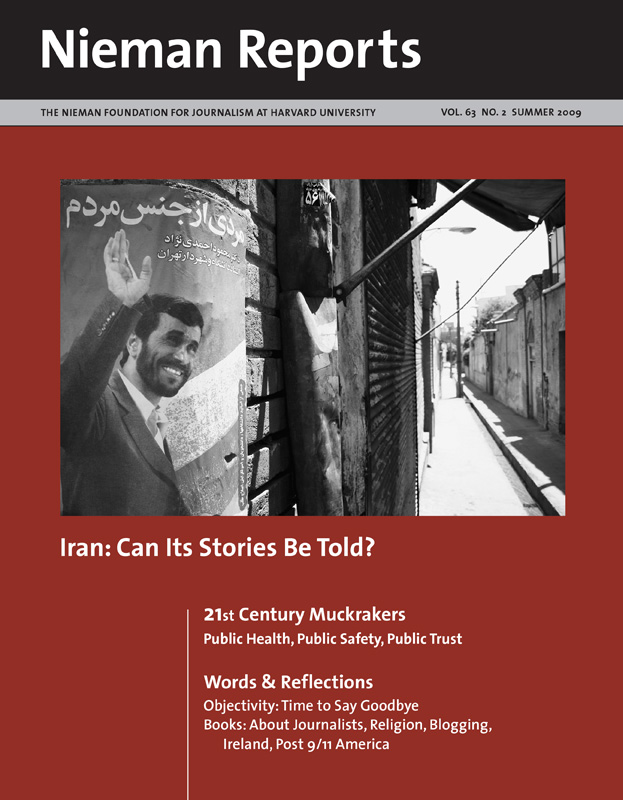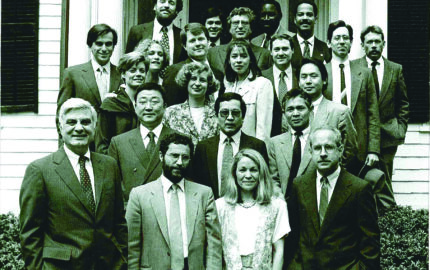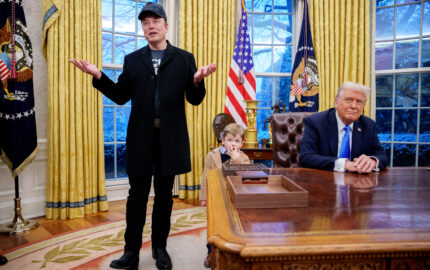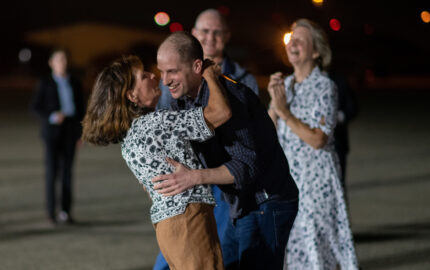Dramatic changes in the world of journalism weighed heavily on the lives and outlook of the Nieman class of 2009: news of layoffs from their newsrooms (and of one of their newspapers disappearing), worry about the future of newspapers, uncertainty about their own paths as journalists. Even as fellows wrestled with these realities, what remained firm was their knowledge that journalism is essential as a bulwark of democracy. Over time, the transformative nature of the Nieman experience broadened their outlook, encouraging them to envision roles in journalism’s future and finding their places in it. They learned how emerging technologies enable connections with larger and well-targeted audiences while at the same time empowering them to tell their stories on multiple platforms and to interact more directly with the public while still adhering to journalism’s core values.
The fellows also found many supportive voices joining the conversation throughout the year speaking to the value of journalism. Following a ceremony at Lippmann House, when the fellows received certificates for completion of their fellowships, Harvard University President Drew Faust urged them to use the digital tools wisely in moving past the mere rapid transmission of information into the tougher work of ensuring understanding. “Go forth,” she said, “to change the world not only in a way that will enable us to survive but to thrive.”
A few days earlier, Martin Baron, editor of The Boston Globe, had reminded the fellows that “Good journalism, as you know, does not come cheap. The most powerful journalism—breakthrough journalism—can be shockingly expensive.” He warned that the “end of reporting that requires a major investment of resources … means we will see a huge void in American journalism. And it will allow people who are powerful, or crafty, or both, to engage in wrongdoing without fear of being held accountable.”
That same evening, the Nieman class honored one of its own, Fatima Tlisova, with the Louis M. Lyons Award for Conscience and Integrity in Journalism. In RELATED ARTICLE
Read descriptions of Tlisova’s investigative reporting with excerpts from remarks she and Jackson made at the Lyons Award ceremony »presenting the award to Fatima, a brave reporter and sensitive spirit, David Jackson, her classmate, said that we were bearing witness to the reality that “no government can commit serious crimes against its own citizens—can practice abduction, torture or genocide—without first silencing the press.”
Tlisova, like many journalists, is at risk in her homeland, and she knows a life of struggle lies ahead by retaining her dedication to bearing witness. Like her, many Nieman Fellows come from nations torn by conflict and often in the grip of authoritarian rulers employing repressive measures to restrict press independence and freedom. For a year, they live in what Jackson called a “privileged exile.” For them, uncertainties lie ahead as they weigh the risks of returning home against the difficulties of finding ways to stay in the safe sanctuary that America offers.
In this time of challenge and crisis for journalists and legacy news organizations, the Nieman Foundation remains fundamentally optimistic. Our fellowship program is forward looking—providing fellows with the all-too-rare opportunity today of being able to think deeply and reflect on how they can best contribute to journalism’s future while fostering the values of excellence and high purpose.
Throughout its existence, the foundation has spoken in a variety of ways to the widening range and of journalism’s possibilities.
These endeavors speak to the enduring principles of quality journalism. At a time when some believe the best of times are in the rearview mirror, the paths that lie ahead for this year’s fellows and for the foundation—while sure to be bumpier than usual—are embedded in promise.
The fellows also found many supportive voices joining the conversation throughout the year speaking to the value of journalism. Following a ceremony at Lippmann House, when the fellows received certificates for completion of their fellowships, Harvard University President Drew Faust urged them to use the digital tools wisely in moving past the mere rapid transmission of information into the tougher work of ensuring understanding. “Go forth,” she said, “to change the world not only in a way that will enable us to survive but to thrive.”
A few days earlier, Martin Baron, editor of The Boston Globe, had reminded the fellows that “Good journalism, as you know, does not come cheap. The most powerful journalism—breakthrough journalism—can be shockingly expensive.” He warned that the “end of reporting that requires a major investment of resources … means we will see a huge void in American journalism. And it will allow people who are powerful, or crafty, or both, to engage in wrongdoing without fear of being held accountable.”
That same evening, the Nieman class honored one of its own, Fatima Tlisova, with the Louis M. Lyons Award for Conscience and Integrity in Journalism. In RELATED ARTICLE
Read descriptions of Tlisova’s investigative reporting with excerpts from remarks she and Jackson made at the Lyons Award ceremony »presenting the award to Fatima, a brave reporter and sensitive spirit, David Jackson, her classmate, said that we were bearing witness to the reality that “no government can commit serious crimes against its own citizens—can practice abduction, torture or genocide—without first silencing the press.”
Tlisova, like many journalists, is at risk in her homeland, and she knows a life of struggle lies ahead by retaining her dedication to bearing witness. Like her, many Nieman Fellows come from nations torn by conflict and often in the grip of authoritarian rulers employing repressive measures to restrict press independence and freedom. For a year, they live in what Jackson called a “privileged exile.” For them, uncertainties lie ahead as they weigh the risks of returning home against the difficulties of finding ways to stay in the safe sanctuary that America offers.
In this time of challenge and crisis for journalists and legacy news organizations, the Nieman Foundation remains fundamentally optimistic. Our fellowship program is forward looking—providing fellows with the all-too-rare opportunity today of being able to think deeply and reflect on how they can best contribute to journalism’s future while fostering the values of excellence and high purpose.
Throughout its existence, the foundation has spoken in a variety of ways to the widening range and of journalism’s possibilities.
- Since the first issue of Nieman Reports was published in 1947, it has been fulfilling its founding purpose: to explore the responsibilities of the press and expand understanding about how journalism can be strengthened.
- The Nieman Watchdog project revolves around the idea that asking the right questions lies at the core of meaningful journalism. In serving as a surrogate for the public, the press is obliged to ask probing questions, from town meetings to the state house to the White House.
- On the Narrative Digest, well reported, powerfully written stories demonstrate why long-form journalism matters as a way of conveying deeper understanding. Here excellent storytelling is showcased and its methods explained.
- The Nieman Journalism Lab, launched last fall in response to industry’s search for workable business models for journalism in the era of digital media, provides real time updates on the rapidly shifting ground on which journalism is rebuilding.
These endeavors speak to the enduring principles of quality journalism. At a time when some believe the best of times are in the rearview mirror, the paths that lie ahead for this year’s fellows and for the foundation—while sure to be bumpier than usual—are embedded in promise.



